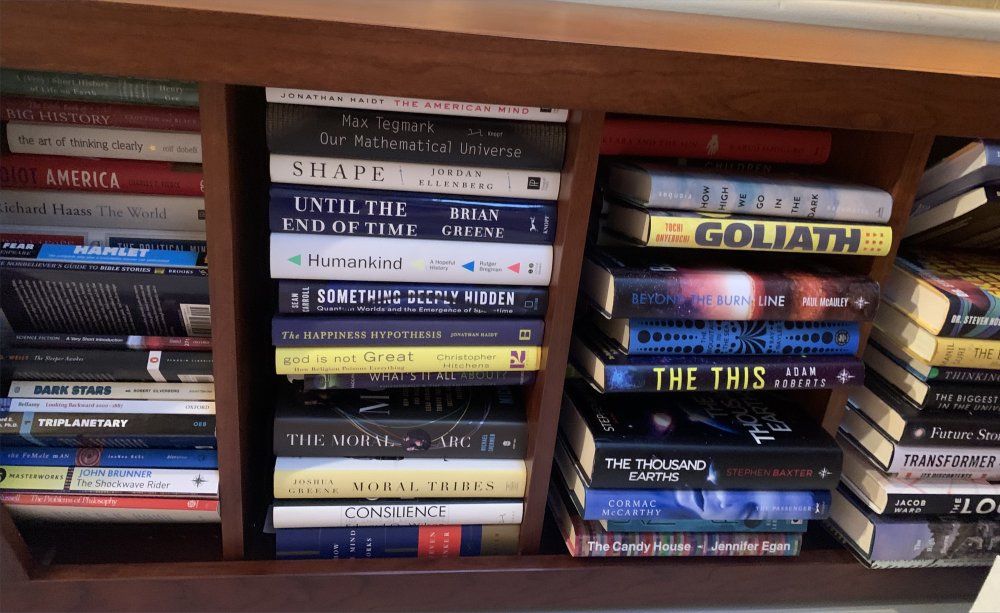About free markets, the fundamentals of biology, and unsustainable growth.
And I probably won’t read them simply because I have so many other books to read, such as the few on a bookcase just to the left of my computer desk. Image turned sideways. (And others all over the house.)
First is this one, seen in a Publishers Weekly review this past week.
Publishers Weekly, 7 Nov 2022: The Big Myth: How American Business Taught Us to Loathe Government and Love the Free Market, by Naomi Oreskes and Erik M. Conway. (Link maybe not accessible to non-subscribers.)
I know of Oreskes; she wrote a book three years ago called Why Trust Science?, a primer for those who don’t understand it, or are just fascinated by the philosophy behind science. (Another book that looked fascinating but which I couldn’t imagine finding the time to read.) And she’s a columnist for Scientific American magazine. From the review:
Historians of science Oreskes and Conway (Merchants of Doubt) return with a persuasive examination of how corporate advocates, libertarian academics, and right-wing culture warriors have collaborated to try to convince the American people that economic and political freedom are indivisible, and that regulation leads inexorably to tyranny.
[…]
Blaming free market orthodoxy for stymieing efforts to combat climate change and expand healthcare, the authors advocate for a middle path that is both “pro-market and pro-government.” Polemical yet scrupulously researched, this wake-up call rings loud and clear.
This is the kind of book I like, on any topic, in that it questions a social assumption that most Americans take for granted and have never thought about.
\\\
Second this, which I think I saw as a suggestion “based on my interests” on Amazon.com.
Amazon: So Simple a Beginning: How Four Physical Principles Shape Our Living World, by Raghuveer Parthasarathy
I love books that identify basic principles from which much apparent complexity can be explained. But I already have a bunch of them. Also, this book is subtitled “How Four Physical Principles Shape Our Living World” yet when I “Look Inside” at the table of contents I see that the book is divided into *three* parts: “The Ingredients of Life,” “Living Large,” and “Organisms by Design.” What are the four principles? Not easy to tell. The publisher/editor doesn’t have its act together.
This also raises the issue of how many such books the market can bear, i.e. even for a reader like me interested in all flavors of science, how many should I need to read? Don’t books like these broadly say the same things? How many different ways are there to spin the fundamentals of science? One answer is: books get written, they sell, they go out of print, yet there’s always an audience for such books, so new books get written on more or less the same topics, with perhaps some updates derived from recent discoveries in the field. Thus, a basic cosmology book from 50 or even 20 years ago wouldn’t suit now…
\\
Third. Via an obituary.
NY Times, 8 Nov 2022: Herman Daly, 84, Who Challenged the Economic Gospel of Growth, Dies, subtitled “Perhaps the best-known ecological economist, he faulted his mainstream peers for failing to account for the environmental harm growth can bring.”
Never heard of him. But he wrote an influential book, it seems, or perhaps several, on the idea that endless growth cannot be sustained. Here’s the first one at Amazon: Beyond Growth: The Economics of Sustainable Development, published in 1996.
On the other hand, how did I miss this NYT profile of him, in the Magazine, just a few months ago? This Pioneering Economist Says Our Obsession With Growth Must End.
This isn’t a new idea, then, but it’s gaining increased traction in a world where climate change — a consequence of the unquestioned doctrine of endless growth — is threatening the planet, or at least human survival. We’ve seen the questioning in recent works by Harari and Rosling and especially Bregman. Questioning the focus on the GDP, and the stock market, an indicator of economic health only for wealthy people.
And as a steady theme in the works of SF author Kim Stanley Robinson.
\\
Now Amazon is reminding me of a similar book, another book that looked interesting but which I decided in September that I wouldn’t read, because it’s 624 pages long, and so didn’t buy. Slouching Towards Utopia: An Economic History of the Twentieth Century, by J. Bradford DeLong.
This is one reason to read book reviews, in order to glean something about books one will never have time to read.






